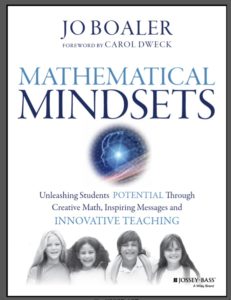In March 2019, the journal Trends in Neuroscience and Education published an article online titled “Mathematical mindsets increase student motivation: Evidence from the EEG.” The paper presents the collaborative work of a mathematician, a neuroscientist and a psychologist and provides evidence for the positive impact of a Mathematical Mindsets approach on the brains of students. The article will be published in the print edition of Trends in Neuroscience and Education in June 2019 (Volume 15, Pages 18-28). A summary of the paper is provided below and can be downloaded by clicking the button. The ideas tested in the study were derived from Jo Boaler’s book, Mathematical Mindsets.
Brain Science Shows Jo Boaler’s Mathematical Mindset Approach Increases Student Motivation and Brain Activity
 Summary of a paper published in Trends in Neuroscience and Education
Summary of a paper published in Trends in Neuroscience and Education
Authored by Ian Daly, Neuroscience, Jake Bourgaize, Psychology, and Alexei Vernitski, Mathematics.
University of Essex
Also featured in an article in Education Week by Sarah Sparks
Many people have seen and been helped by the research on growth mindset (Dweck 2006). Jo Boaler realized that mindset ideas can fall flat for students if they are accompanied by fixed mathematics. When teachers present mathematics as a subject of one right or wrong answer and one method, students do not see how they can grow and learn. In her best-selling book Mathematical Mindsets, Jo sets out an approach to mathematics that presents it as a growth and multi-dimensional subject.
Recently a collaboration between a mathematician, neuroscientist and psychologist set out to investigate the impact of Jo’s ideas on the brains of college students. They used an EEG, which measures electrical impulses, to track brain activity as college students worked through either standard math problems or problems designed with the approach outlined in Jo’s book (Boaler 2016, pages 57-91):
- Open up the task so that there are multiple methods, pathways, and representations
- Include inquiry opportunities
- Ask the problem before teaching the method
- Add a visual component and ask students how they see the mathematics
- Extend the task to make it lower floor and higher ceiling
- Ask students to convince and reason; be skeptical
In addition to EEG analyses, students were surveyed using mindset questions from the Program for International Student Assessment, such as “I am strongly motivated to solve the problem,” “I intend to put in a good effort solving this problem,” and “Doing well at this problem means a lot to me.”
Students who were given standard math problems reported less interest in continuing the test as they answered more questions. By contrast, the students answering the Mathematical Mindset problems actually became more motivated as they worked.
Additionally, the EEG testing found stronger patterns of activity associated with motivation and engagement—shifting activity to the left side of the prefrontal cortex—in the brains of students who were working through Mathematical Mindset problems. In prior studies, this pattern of “motivation-related” brain activity tends to decline when students work through challenging problems, but it increased with the Mathematical Mindset approach.
This difference was apparent even though participants were not informed about mathematical mindset theory and were unaware that some problems were formulated according to mathematical mindset theory and others were not. This provides evidence that using Jo’s Mathematical Mindset approach to structure mathematics problems increases learner motivation even when learners are not explicitly aware of it.
“By presenting mathematical problems formulated according to mathematical mindset theory to learners, it is possible to increase learner motivation … by engaging the brain’s stimuli reward pathways,” the researchers concluded. “This provides evidence that, by only making simple changes to how mathematical problems are presented, it is possible to increase the motivation of mathematical learners.”
References
Boaler, J., (2016). Mathematical Mindsets, Jossey-Bass.
Daly, I., Bourgaize, J., & Vernitski, A. (2019). Mathematical Mindsets Increase Student Motivation: Evidence from the EEG. Trends in Neuroscience and Education, 15, 18-28.
Dweck, C., (2006). Mindset: The New Psychology of Success, Random House.
